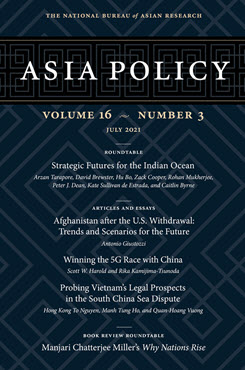Manjari Chatterjee Miller’s Why Nations Rise: Narratives and the Path to Great Power
Why do some rising powers become great powers while others do not? Michael J. Green, Prasenjit Duara, Jennifer Lind, Chris Ogden, Harsh V. Pant, and Manjari Chatterjee Miller discuss this question and factors driving the rise of states in this book review roundtable on Miller’s book Why Nations Rise: Narratives and the Path to Great Power.
Why Nations Rise and Why Regime Type Matters
Michael J. Green
Why Nations Fail to Rise
Prasenjit Duara
Great Power Drives Great-Power Narratives
Jennifer Lind
Great Power as Narrative Contestation
Chris Ogden
It Is Not Decided Yet: The Scripts of China’s and India’s Rise Are Still Being Written
Harsh V. Pant
Author’s Response: The Process of Rising—Ideas and Power in Power Transitions
Manjari Chatterjee Miller
Michael J. Green is Director of Asian Studies and Chair in Modern and Contemporary Japanese Politics and Foreign Policy at the School of Foreign Service at Georgetown University (United States). He is also a Senior Vice President for Asia and Japan Chair at the Center for Strategic and International Studies.
Prasenjit Duara is the Oscar Tang Chair of East Asian Studies at Duke University (United States).
Jennifer Lind is an Associate Professor in the Department of Government at Dartmouth College (United States), a Faculty Associate at the Reischauer Institute of Japanese Studies at Harvard University, and a nonresident Associate Fellow at Chatham House in London.
Chris Ogden is a Senior Lecturer/Associate Professor in Asian security at the University of St. Andrews (United Kingdom) specializing in the great-power rises of China and India.
Harsh V. Pant is Director of Research and Head of the Strategic Studies Programme at Observer Research Foundation, New Delhi (India). He is also a Professor of International Relations at King’s College London (United Kingdom) and Director (Honorary) at the Delhi School of Transnational Affairs at Delhi University (India).
Manjari Chatterjee Miller is a Senior Fellow at the Council on Foreign Relations (United States). She is on leave from the Frederick S. Pardee School of Global Studies at Boston University, where she is an Associate Professor of International Relations.
About Asia Policy
Asia Policy is a peer-reviewed scholarly journal presenting policy-relevant academic research on the Asia-Pacific that draws clear and concise conclusions useful to today’s policymakers. Asia Policy is published quarterly in January, April, July, and October and accepts submissions on a rolling basis. Learn more


